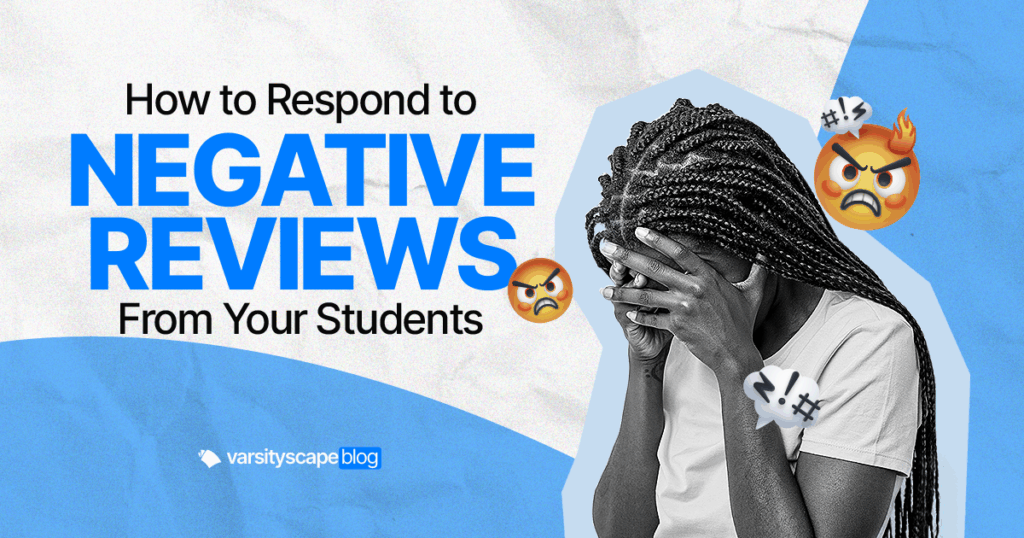
It’s tough seeing someone leave negative feedback on your course in the public domain.
Especially when you’ve put your all into creating your course, tirelessly building and marketing the course to gain enrolments.
However, no matter how perfect your course seems, you’re bound to get some criticism.
It’s the hard truth.
Yes, we know- it feels personal, considering your hard work. But it’s also a chance to grow and build trust.
The real question should be: ‘How will you handle them when they come?’
This guide isn’t about dodging negative feedback. It’s about turning it into something that can help you improve your courses and connect with your students more.
Let’s start by looking at why negative reviews are not just something to deal with but actually something to value.
Understanding the Impact of Negative Reviews
Here’s the thing: negative reviews are just as important as positive ones. They show that you are an authentic course creator with real people taking your course.
What’s more — about 17% of people who leave reviews do so with the intention of helping. They’re not just complaining; they want to see your course improve.
However, absorbing and acting on negative feedback is not an easy thing to do, especially when you are heavily invested in creating your course. It’s natural to feel defensive when someone criticises you for something you have poured your heart into.
Yet, the way you handle this feedback is crucial to how things turn out.
A lot of people, about 85.3%, in fact, say that they think twice about signing up for a course if they see bad reviews.

Image via Pissed Consumer
But it’s not just the bad stuff they’re looking at.
They’re also looking at how you handle the feedback. If you respond well, it shows you care and that you’re willing to improve your course.
So, while it might not feel great at first, getting a negative review can be super useful. It’s an opportunity to show off how dedicated you are to making your course the best it can be.
Plus, it helps you learn and grow, making your course stronger in the long run.
So, what should you do when someone leaves a negative review on your course?
1. Acknowledge and Apologise
First things first, let the student know you hear them.
It’s important to say you’re sorry they had a bad experience. This isn’t about whether you think the feedback is fair or not. It’s about respecting their feelings.
A simple, genuine apology can go a long way. It shows you care and take their feedback seriously. Saying sorry is about being kind and respectful, not necessarily admitting you did something wrong.

2. Be Specific in Your Response
Address the specific points they made.
When you answer, go into details about what they mentioned. If they said the course materials were confusing, explain how you plan to make them clearer.
This shows you’re not just giving a blanket response but are really thinking about their feedback and how to improve.
For instance, if they said a quiz was too hard, talk about how you might adjust it to be more fair. This way, they know you really thought about their feedback and are looking into ways to make things better.
It’s like saying, “I see exactly what you’re pointing out, and here’s what I think we can do about it.”

3. Take the Conversation Offline
Some conversations need more than just a quick public reply. It might be a good idea to talk more in private, through email or a phone call.
This gives you both a chance to dive deeper into their feedback without everyone else watching. It also shows you’re serious about fixing the issue.
Moving the chat to a private space is about giving the problem the attention it deserves and working together to solve it.

When you try to approach every negative review with these three do’s in mind, you show that you are:
- Easily accessible
- Always working to make the course better
- Honest about your intentions of creating the course
- Intentional about crafting the best learning experience for them
The Do’s of Responding to Negative Reviews
The Don’ts of Responding to Negative Reviews
1. Never Ignore Reviews
Ignoring or taking negative reviews down might be the easiest and most enticing way out, but what sort of course creator would that make you?
When you do not reply to negative reviews on your course, it gives a lasting impression of irresponsibility and a lack of dedication to your students.
And when prospective students see this, they immediately imagine themselves in the shoes of the student who left the negative review.
Would you leave them hanging like their peers?
So they don’t have this misconception about you and your brand, you should always acknowledge feedback. This is the best way to show them that you are attentive and committed.
2. Avoid Being Defensive
It is natural to be on the defensive when you are given negative feedback. While natural, it might be harmful to your future prospects of scaling.
When you go on the defensive, you give off a couple of signals. You are indirectly:
- Invalidating the feelings of the learner
- Being manipulative and hinting that they are wrong for trying to help you improve your course
If you don’t watch your response, you damage your reputation as an instructor who’s open to feedback. And if you are a new course creator without previous social proof examples to pull from, you are hurting your chances of ever selling a course.
Instead, take some time off. You don’t have to reply immediately as you might reply in a manner you don’t mean to.
Put yourself in the shoes of the learner. Ask yourself, “What were they trying to communicate?”
When you do this, chances are you’ll reply in a way that is empathetic, give a response that is specific to the review, and show that you are open to criticism.
3. Don’t Make False Promises or Use Ready-made Answers
When you are too hasty to reply to a negative response, you are more likely to sound ingenuine.
Is it a bad thing to reply promptly? No.
But should you do so at the risk of making fake promises or being unrealistic in your replies? Also no.
It is important to understand what you can and cannot change. This should be clear before even beginning creating that course.
It helps you understand the flexibility of your strengths and weaknesses.
If something is going to take a while to fix, that’s okay. Just state it clearly so you don’t give anyone false hope.
People will appreciate your honesty because they can tell you mean every word of it.
Turn Negative Reviews into Opportunities
You can turn all the negative reviews into something positive. Here’s how you can do that:
1. Evaluate and Refresh Your Content
If everyone says the same thing about something, then it must be true.
What are the common negative reviews about?
Is your explanation style too beginner-inclined or too complex? Are the instructions unclear or are they outdated?
If these form the basis of the reviews, then it’s a sign that you should revisit and update your course content.
Taking this approach will likely result in a three-fold effect:
- Resolve the immediate concerns of the current learners
- Improve your course content
- Enhance the learning experience for future learners
2. Improve Your Delivery Method
Teaching is effective when the other person gets it. So, when you receive negative remarks from students, it is highly likely that your delivery style could be better.
Maybe they want your course to be more interactive and engaging.
If it is a live class, turn on the camera.
While video content may be one of the most engaging content formats, vary learners’ exposure. Consider including quizzes, live demonstrations and group assignments.
Varying the style of content delivery can make your class more enjoyable.
3. Student Support
If students feel lost or need more help, think about ways you can be there for them.
Maybe you can answer questions by email more quickly or set up a place where students can talk to each other.
Encourage Positive Reviews
Creating a vibe in your course where everyone feels pumped and ready to learn can really make those positive reviews flow in.
Here’s how to nail it:
Crafting a Positive Learning Environment
Start by making your course as engaging and interactive as possible. Mix things up with videos, quizzes, and real-world projects.
When students are having fun while learning, they’re more likely to feel good about the course.
Also, be there for them.
Regular feedback, quick answers to questions, and offering extra help when needed show you care.
That kind of support makes students feel valued and more enthusiastic about sharing their positive experiences.
Encouraging Students to Share the Love
So, when’s the best time to ask students to spread the word about your awesome course?
- Right After a Win: Maybe they aced a test or finally got the hang of a tricky concept. That’s when they’re feeling great about the course and likely to share their success.
- End of the Course: Wrap things up with a heartfelt thank you message and a gentle plea to leave you a review while It’s still fresh in their minds — when they’re still feeling accomplished.
But, how do you ask?
Keep it simple and sincere.
Let them know how much their feedback means to you and how it helps the course.
You could even offer a little incentive, like access to an exclusive webinar or a sneak peek at future content. Just make sure whatever you’re doing feels genuine and not like you’re just fishing for compliments.
How to Monitor and Maintain Your Online Reputation
Keeping a good online reputation for your course means you’ve got to know what people are saying about it. Here’s a straightforward way to do it:
Tracking Online Reviews
Instead of searching the internet every day for reviews about your course, you can keep tabs on your reviews using Google Alerts. You can set it up to notify you anytime someone mentions you or your course online.
Just like this:

Social media management tools like Hootsuite or Buffer can also help you monitor mentions across different platforms.
Another handy practice is regularly checking the places where your course is reviewed, like Reddit, Quora, or your own feedback section on VarsityScape or the platform where the course is hosted.
Make it a part of your routine, maybe once a week or so, to see what’s new.
Using Positive Social Proof to Shine
Positive testimonials and success stories from your students don’t just feel-good—they show the value of your course.
When potential students see these stories, they can help balance out any negative reviews that might pop up.
Here’s how to make those positive reviews work for you:
- Showcase Success Stories: If a student lands a great job or achieves something awesome after taking your course, share that story (with their permission, of course). It could be on your website, in a newsletter, or on social media.
- Encourage Happy Students to Speak Up: Sometimes, students need a little push to share their experiences. If you know a student that loved your course, ask if they’d be willing to write a testimonial or share their story publicly.
- Respond to Positive Reviews, Too: When someone leaves a positive review, say thanks! It shows you’re not just responsive to criticism but that you also appreciate the positive feedback.
Let’s take a look at how Product School improved feedback from students after employing these techniques.
Case Study: Product School’s Success Story of Overcoming Negative Feedback
When Product School got a tough review on Reddit, they didn’t hide. Instead, they used it as a chance to get better. Here’s a simple look at what they did and what we can learn from them:
How They Handled a Bad Review
A Reddit user wasn’t happy with a Product School course, saying it wasn’t challenging enough and not worth the money. Even though this was just one opinion, Product School took it seriously.
Talking to Future Students
When someone thinking about taking a course mentioned the bad review, Lorenzo from the Product School admissions team saw it as a chance to talk about how they’ve made their courses better. Here’s what he did right:
- Be Positive: He thanked the person for bringing up the review, showing it’s good to get feedback.
- Know the Details: Lorenzo mentioned he read the Reddit post, so he knew exactly what the person was unhappy about.
- Talk About Improvements: He shared that the course has gotten a lot of updates since that review. This shows they’re always trying to make things better.
- Make It Personal: He focused on what the future student was looking to get from the course, making his reply more meaningful.
- Show Proof: Sharing links to the profiles of experts who help with the course made it clear that they offer quality education.
Making the Course Better
Product School didn’t just talk about making changes; they actually did it. They:
- Updated Their Curriculum: They got input from the leading product managers at top companies like Google and Amazon to ensure the course content is cutting-edge and relevant.
- Improved the Learning Management System (LMS): Upgraded the LMS to ensure it provides a more immersive and user-friendly learning experience for future students.
- Certification Examination: Introduced a certification examination that helps to validate students’ knowledge, setting a global standard in Product Management certification.
These improvements took place because Product School was willing to address the feedback and improve the overall value of the course for all students.
What We Can Learn
Product School’s story teaches us to see bad reviews as helpful. They show us where we can do better. By listening and making changes, you can improve what you offer and make your customers happier.
Every review, good or bad, is a chance to grow. How you react and what you do next can really make a difference.
You See a Negative Feedback? We See an Opportunity
As we’ve come to agree: Negative reviews are actually pretty great.
They give you hints on how to make your course even better. Think of every negative review as a chance to chat with your students and boost your course’s value.
And here’s where VarsityScape comes into the picture. It’s like having a helper for making the most out of all that feedback. VarsityScape gives you the tools to easily talk with your students and see what parts of your course need a little extra love.
It’s all about turning those reviews into action and making your course the best it can be.
With VarsityScape, we can use it to our advantage, making our courses better and our students happier. Sign up to VarsityScape today to enjoy a better learning experience.



